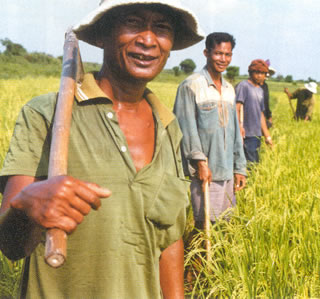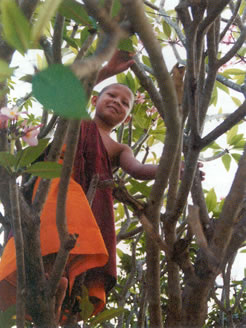Volunteering for an NGO as a Photographer
Be an Active Participant in the World’s Struggles and Victories
Article and photos by Jim Hall
 |
Dry-season rice farmers in Kompong Leng, Cambodia. |
I climbed out of the SUV after two hours of driving on what would most accurately be described as a goat trail and was told to grab a bag of provisions and wade across the river. On the other side, three motorcycles with drivers waited. From there it was another 30 minutes by hilly jungle paths to the remote province of Rattanakiri in the northeastern corner of Cambodia. As we were walked into the circle of 40 or so houses in a clearing in the jungle, the project director for the village whispered to me, "Stay close to me for awhile. I need to introduce you and explain everything. You know, you’re only the seventh non-Cambodian who has ever been to this village."
I was a volunteer photographer for CARE — a nongovernmental organization (NGO) with relief and development programs around the world. In a matter of 10 days, our crew (a writer, my brother, and I) stayed in five different provinces spread out across the country. Our job was to visit CARE projects and document their progress for internal and external publication. That was four months ago. I wound up staying in Cambodia for two months total and worked with seven more NGOs. During that relatively short time, I got a view of life and society in Cambodia that would have been nearly impossible to gain on my own. On top of that, I had the chance to support causes I believe in and gain experience in a field I long aspired to work in.
Easy to Arrange
What is perhaps most surprising about it all was how easy it was to arrange. I opened the phone book, got CARE’s local office number, and simply asked them if they had any need for a volunteer photographer in Cambodia. A week later I received a call from the national headquarters in Atlanta with an assignment. Next I went to the website of World Vision (another NGO) and sent an email to the Communications Director in Cambodia, who drafted a 2-week itinerary for me. Without even opening up a guidebook, I had nearly a month of travel in Cambodia already planned for me.
If you aren’t familiar with the range
of NGOs out there, I recommend starting your search at InterAction.
They have links to nearly every major NGO in existence. Even if
you can’t find any positions available with one of the large
international NGOs, don’t be discouraged. Many smaller local
NGOs are usually in much greater need of volunteer help. The only
trick is finding out about them. Try asking a larger NGO in the
country to refer you to local NGOs or simply run a web search.
Risk-takers may just want to go with the "doorstep" approach — waiting
until you arrive to find an organization, showing up unannounced,
and offering your services. This works fairly well with many of
the local NGOs. The NGO community within most of these countries
is usually very close, so if you do good work for one, word gets
around fast and it is often relatively easy to get referred to
another organization.
As my example shows, it is not difficult to find a position with an NGO if you keep a couple of things in mind: First of all, if at all possible, try to volunteer for the organization before you go overseas. I was able to get an assignment with CARE shooting a local event in Seattle before I left, and I think that helped them feel confident about investing their time and money in my work.
Next, have a useful skill. I asked Sharon Wilkinson, the director for CARE Cambodia, about what kind of skills CARE sought for most volunteer positions.
"Primarily, we look for people who have skills that can span a wide variety of uses across many different departments," says Wilkinson. Familiarity with databases, writing, photography, editing, and typing were a few of the skills she mentioned. She also mentioned the need for individuals who had very specific knowledge on development issues such as anti-retrovirals, hygiene, and water safety. Such positions are very short-term and involve evaluating and possibly updating the existing materials used by the NGO. But there are also many long-term opportunities as well. Another aid to your quest for a volunteer NGO position is to be flexible. Make it as easy as possible for them. The more dates and places that you make available, the more likely you’ll be given a chance to work.
Finally, be persistent. Talk to as many people in the organization as possible, and especially try to talk directly with an individual working in the country in which you’re interested. Given the availability and widespread use of email, even someone working in a relatively small town in Cambodia is not beyond your reach.
 |
A young monk picks flowers for Lao New Year festivities in Luang Prabang, Laos. |
Costs and Benefits
For most developing countries, the biggest
expense of your trip will simply be getting there. Health insurance
during your stay, which is required when volunteering with some
larger NGOs, can also be rather costly. See worldnomads for
relatively inexpensive and comprehensive travel
insurance. Housing
expenses can be minimal if you are willing to give up some comforts
like A/C or a private bathroom.
The benefits of the volunteer contract may differ greatly depending upon the NGO. One reimbursed me for my food, lodging, and in-country plane fares; another did not.
The greatest and most obvious of benefits to volunteering for an NGO abroad is the direct experience you’ll gain during your time there. Wilkinson told me that all volunteer work done there was fully evaluated and documented so that it could be easily referred to when looking for employment in the future. Don’t be discouraged even if it doesn’t sound like you’ll be given many responsibilities while you’re there — volunteers who show initiative and interest often take on much more than they were initially assigned to do. I talked to one volunteer who said when she began work with CARE she was asked to do some basic editing of documents and forms, but because of her enthusiasm she wound up taking on the Herculean task of revising and rewriting all of the forms used in the entire office. Among other things, this gave her the opportunity to become familiar with the daily operations of CARE (and NGOs in general).
Socializing after hours with the NGO community by going to local events and parties or expat hangouts is also a good way to scout out more work opportunities with other NGOs in the area.
When I was in Cambodia two years earlier I was a tourist, typically not staying in one city for more than five days. This time around I got a 2-month trial run at life as an expatriate in Phnom Penh. This is a good way to test how you hold up under such circumstances before signing up for a long-term commitment. Settling in for a while allows you to form deeper relationships with people than you would otherwise — both locals and expats. I became good friends with my motodop (motorcycle-taxi driver), who ended up taking me out to the countryside for a few days to live in his family’s home and attend his sister-in-law’s traditional Khmer wedding. In return I took photos of their family and of the wedding festival for them.
Working with an NGO, especially as a photojournalist, gave me the privilege of observing what life was like for a wide cross-section of society: orphans, monks, HIV/AIDS sufferers, garment-factory workers, sex workers, rice farmers, fishermen, silk weavers, and landmine victims. Ultimately, by volunteering for an NGO you are helping in the efforts to build sustainable development and economic independence within that society, an active participant in its struggles and victories.
JIM HALL is a
freelance photographer who has worked for many different famous
institutions and for many different publications throughout his life. Visit his website
at www.jameshallphotography.com.
|
